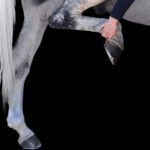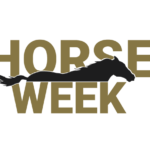[/caption]

Hong Kong, August 11, 2008 — The U.S. eventing team’s Olympic medal initiative fell apart on cross-country day with a series of big disasters and small mishaps that plummeted the squad from third place to a dismal seventh.
An impressive German contingent overtook Australia in the standings, while Great Britain moved from fourth to third. It seems that these three teams have locked up the medals–barring a disaster in tomorrow’s show jumping.
But there is a bright spot for the U.S. An individual medal is still a possibility for Gina Miles, who keeps rising to the occasion and is tied for fifth with her steady longtime partner, McKinlaigh.
While the morning generally was depressing for American supporters, anyone looking at the big picture had to be elated by the way the competition came off.
There had been predictions of doom; that the oppressive heat and humidity endemic to August in Hong Kong could foster a climate conducive to catastrophe for a sport whose safety record has been in question.
But the weather cooperated with temperatures in the low 80s, while the rain held off until the last few riders were setting out on course. There were no injuries and just four falls as the event’s highest-profile segment ended without a hitch. Several years of intense effort, meticulous planning and an overriding concern for the future of the discipline gave it a tremendous boost.
“Today was a huge step forward for the sport,” said Princess Haya, president of the FEI (international equestrian federation). “There was no other option other than to have the result we had today.”
With the whole world watching, a single ugly picture would have been a calamity. Eventing has been in danger of being dropped from the Olympics in the past, and a recent spate of serious injuries and deaths certainly didn’t help its cause. But today’s outcome boosted its stock and offered more ammunition for Princess Haya, a member of the International Olympic Committee, to fight its detractors on that panel.

Rider responsibility, the new mantra of the sport, paid off as competitors handled their horses sensibly, not pushing too hard or taking major risks.
No one made the optimum time of eight minutes, the shortest ever for an Olympic event. Australia’s Shane Rose on All Luck came closest, and he was 23 seconds over.
“I never believed anybody would get the time,” said course designer Michael Etherington-Smith.
He could finally breathe a sigh of relief, but typical of this magnanimous guy, he didn’t take the credit for how well things went, citing everyone who worked with him.
“It was a huge team effort. These guys have done an amazing job producing the course in what has been pretty testing conditions,” he commented.
The route was gorgeous and the spectators who swarmed over the Hong Kong Golf Club grounds at Beas River were wowed by such signature jumps as the Great Wall of China, the multiple-effort Five-Colored Lake and the Crouching Dragons.
I was at the lake as the lead-off U.S. rider, Amy Tryon on Poggio II, aced it. The individual bronze medalist at the 2006 World Equestrian Games looked likely to handle the entire route as efficiently as she went through the water.
Few horse/rider combinations are as experienced as these two, but accidents do happen. At the 10th fence, The Birdcages, Poggio fumbled, and Amy went off. Under a new rule, one fall means elimination, so that was that for the last championship outing of Poggio’s career.

I asked Amy what happened, and here is what she told me.
Gina Miles put in a trip that clearly stated all was not lost as she shouldered extra responsibility following Amy’s mishap.
But as it turned out, Amy’s fall was just the start of the American squad’s trouble. Becky Holder, fifth after dressage with Courageous Comet and a real medal threat, was enjoying a beautiful trip until she got to the dragons and had a refusal. On reapproaching the fence, she crossed her own line and was charged with another refusal. She is now in 48th place.
Karen O’Connor, wearing a bracelet made from the tail of her beloved pony, the late Theodore O’Connor, was aboard the team’s least-experienced horse, Mandiba.
A test of this nature was asking a lot of a still-developing horse, and he had refusals at two difficult fences, the second part of the triple at the Yu Gardens, number 9, and number 28, the Pagodas, the next-to-last obstacle, but still managed to finish, albeit in 54th place.
“Karen’s horse is young, it’s probably a year or two too soon for him,” said coach Mark Phillips. “We took a chance on him and just a couple of fences he showed his greenness. But he’s grown up a lot on this trip and he’s a great prospect for 2010 (the World Equestrian Games).”
With the team medal gone, anchor rider Phillip Dutton had only his own fortunes to consider on his Rolex Kentucky winner, Connaught.
No one is as determined as Phillip, yet conditions did not allow him to get the job done the way he wanted to, and he was 49 seconds over the time.

He remains in 14th place, but is tied with Britain’s William Fox-Pitt, who moved up 20 places on a ride only two seconds slower than Shane’s.
Individually, Australia’s Lucinda Fredericks lost her lead and is standing 11th with Headley Brittania as her husband, Clayton, upheld the family honor on 2007 Rolex Kentucky winner Ben Along Time and moved up from sixth to fourth.
Lucinda explained to me what had happened with her clever mare.
The team medals will be a battle between Germany with 158.1 penalties and Australia, which is less than four penalties behind on 162. Britain is back of that on 173.7 and a surprising Italian squad in fourth would seem to have no hope with 198.4. I suspect, however, that finishing fourth won’t be too disappointing for a team that was never mentioned as a medal possibility.
This is a grudge match of sorts for the Germans. You’ll recall that they lost the gold medal in Athens after France, Britain and the U.S. successfully protested the result because team member Bettina Hoy crossed the starting line two times.
Hans Melzer, the German coach, told me the Athens loss continues to rankle. The squad is the same as the one that rode in Greece, with the exception that Bettina–whose horse was injured–has been replaced by Peter Thomsen.
Athens, Melzer said, “is still in everyone’s mind somewhere. This was a good day, because it’s the same team, and we are very proud about this.”
The Germans are now 1-2 in the individual standings. Hinrich Romeike on the amazing gray, Marius, leads teammate Ingrid Klimke on Abraxxas by a mere 0.5 penalties. The unheralded Megan Jones of Australia with Irish Jester, is 0.3 points behind Ingrid with a total of 51. Clayton has 53.4 penalties and Gina is on 56.1, as is Mary King of Great Britain (Call Again Cavalier).
So it will be a very close race for individual honors tomorrow night back at the stadium in Sha Tin.
The way things went today should open new doors for eventing in places previously deemed too inhospitable to host major competitions.
But several participants with whom I spoke wished there had been more space between the jumping efforts, rather than having such a condensed test.
Mark had expected a 10-minute cross-country and was surprised to find on arrival that it would be only eight minutes, although a decision had been made on that by officials months earlier. Knowledge of the situation might have enabled some competitors to prepare differently, or bring horses more suited to this test.
Mike E-S (as he is known) said when asked if eight-minute cross-country outings were going to be the norm now that he couldn’t address that, since he was only involved in Hong Kong. But there is concern among some about the sport’s direction, based on how things were done here.
Amy told me that when horses can’t relax a bit between fences, they may get frantic.
“It’s really difficult for them. It’s a tough track to ride. If that’s what our sport’s coming to, then we need to change the type of horses,” she said. “These horses are used to being able to go out on course and get into a rhythm and relax off the bridle, sort of like a racehorse that does longer distances. They have to be able to go out and relax to do their jobs. This kind of course doesn’t lend itself to that. You’re up and down on the side of a hill and turning back. It’s a tough question to ask the horses. It doesn’t make it easier or nicer to ride, that’s for sure, having it shorter.”
I’ll be back with you tomorrow with the results of the team and individual medal competitions. Choi keen!
Award-winning equestrian journalist Nancy Jaffer is covering her eighth Olympics. Her columns, photos and articles appear regularly on EquiSearch.com.





